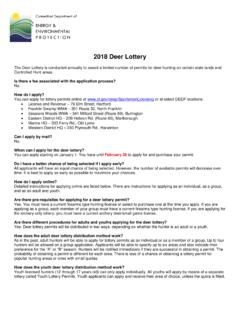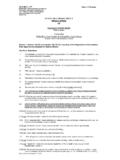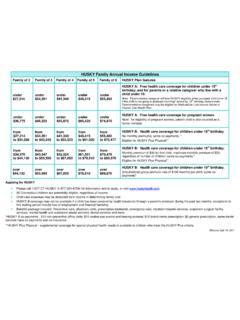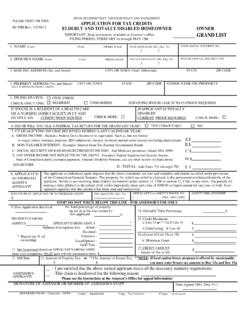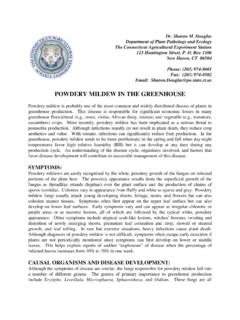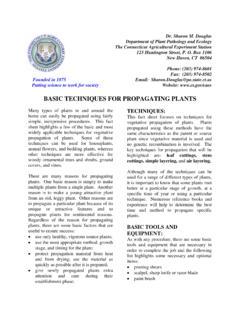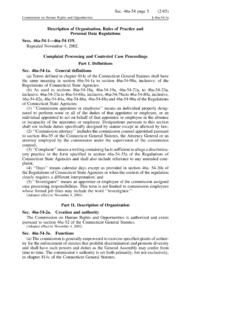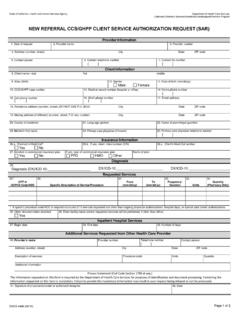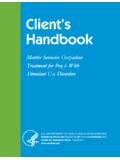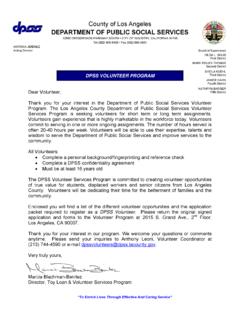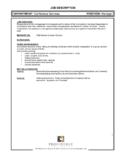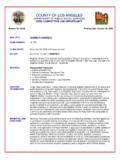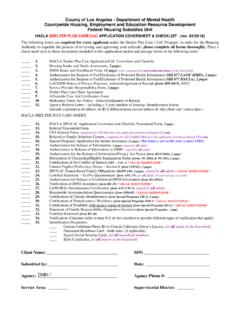Transcription of STATE OF CONNECTICUT Department of Mental …
1 STATE OF CONNECTICUT . Department of Mental Health and Addiction services SUPPORTED RECOVERY HOUSING services . SUPPORTED RECOVERY HOUSING services increase the length of overall health and LIST OF SAMPLE FORMS. (SRHS) DOCUMENTATION INSTRUCTIONS recovery while decreasing the risk of relapse. Client Service Agreement To complete the case management SRHS case management assistance should Consent to Disclosure and Re- requirement for Supported Recovery support the client in securing basic needs, disclosure of Confidential Information Housing services , providers must maintain housing, employment, entitlements, and Records (ROI). hard-copy service documentation files for transportation, and treatment services . On- each client they serve. DMHAS and /or ABH.. site services should include referrals to DSS SRHS House Rules will review these completed forms to verify entitlements, the Behavioral Health Grievance Procedure the provision of case management services .
2 Recovery Program (BHRP) or Access to Intake Assessment Form Recovery III, vocational/educational Recovery Plan The goals of SRHS case management opportunities, housing subsidies, medical or services are to: utilize a person-centered, other treatment appointments, energy Job Readiness Form strength-based approach and promote the assistance, food stamps and other potential Progress Notes (sample only). active participation of the client in stating sources of income and community recovery Discharge preferences and making decisions that supports. Sign In Sheet support recovery skills, foster independent Treatment Verification Form (BHRP only). living, promote community integration and Case Management supports are not meant to be provided in a group setting. CLIENT SERVICE AGREEMENT. PURPOSE OF FORM: Helps set very clear expectations for the client of what they will receive from the SRHS provider.
3 WHAT IS ON THE FORM: In clear and simple terms, the provider should describe services offered at the supported recovery house. WHEN THE FORM SHOULD BE COMPLETED: At intake - before the individual moves into the house. The client should sign, indicating that he or she has read and understands the rules of the house. RELEASE OF INFORMATION (ROI). PURPOSE OF FORM: Protects the client's personal health information (PHI) and allows the client to specify under which circumstances and which parties have temporary permission to discuss their health information. Please note that it is illegal to discuss a client's services without an ROI - even with the best intentions. WHAT IS ON THE FORM: The form explains a client's rights where their health information is concerned and explains that by completing the form, they are giving the specified parties permission to discuss PHI for the purposes of providing quality services .
4 Please put the name of your house on line #2 and the name of any clinical/treatment provider on line #3. WHEN THE FORM SHOULD BE COMPLETED: At intake. Additionally, if the form expires before services are completed. The form should be completed again to extend through the end of services . Providers may recommend that clients make the form valid for 180 days. SRHS HOUSE RULES. PURPOSE OF FORM: Clearly outlines the rules associated with SRHS. WHAT IS ON THE FORM: A comprehensive list of house rules, including clearly defined consequences explaining what may happen should the client violate these rules. WHEN THE FORM SHOULD BE COMPLETED: The form should be reviewed item by item at intake. The client should sign indicating he or she has read and understands the rules of the house. Page 1 of 18. STATE OF CONNECTICUT . Department of Mental Health and Addiction services SUPPORTED RECOVERY HOUSING services .
5 CLIENT RIGHTS AND GRIEVANCE PROCEDURE FORM. PURPOSE OF FORM: Explains the client's rights including right to file a complaint without the risk of losing services solely for filing the complaint. WHAT IS ON THE FORM: Explanation of client rights and how to file a grievance. WHEN THE FORM SHOULD BE COMPLETED: At intake. INTAKE ASSESSMENT FORM. PURPOSE OF FORM: Obtains information about the client, helping to better provide and coordinate services . This form can include the client's history of use, needs, and strengths as well as record basic demographics and contact information. The intake form contains all of the mandatory data fields required by the DMHAS DDAP system. These fields are identified by a number in parenthesis that corresponds to the data element in the DDAP standard file format. WHAT IS ON THE FORM: Sections for demographics, Husky status, legal status, entitlement and benefits, family and other supports.
6 WHEN THE FORM SHOULD BE COMPLETED: At intake or at the first case management meeting. RECOVERY PLAN. PURPOSE OF FORM: Documents the short-term goals the client will work toward while in the SRHS house. WHAT IS ON THE FORM: Goals agreed upon by client and case manager, the expected date or timeframe over which both parties expect the goals to be met, and specific measurable action steps necessary to reach goals. This form is based on issues identified in the intake assessment. WHEN THE FORM SHOULD BE COMPLETED: At the first case management meeting with client and reviewed at each subsequent meeting. JOB READINESS. PURPOSE OF FORM: Tracks employment searches and other work readiness steps taken by the client. This form is required of all clients when applying for their second month of SRHS. Case managers may find this form useful for tracking employment searches or other employment readiness activities for those clients who have a goal of finding employment.
7 WHAT IS ON THE FORM: Space for the client to indicate places they have applied for employment, dates of interviews, contact people at the agencies, etc. WHEN THE FORM SHOULD BE COMPLETED: Ongoing. In order to receive a second 30 days of SRHS, the form will need to be submitted. The form should also be reviewed at case management meetings. PROGRESS NOTES. PURPOSE OF FORM: Records case management services . Notes should track the client's progress toward achieving goals, document the case manager's work on behalf of the client, and summarize the client's recovery status. WHAT IS ON THE FORM: The form is available electronically in the web-based ATR and BHRP systems. Form is client specific and includes the date and time of the session, a brief summary of the client's status and steps taken towards his or her recovery goals. WHEN THE FORM SHOULD BE COMPLETED: At least weekly, and after every meeting with the client.
8 Notes must be documented electronically within 60. days of the intervention. All notes must be documented in the web-based ATR or BHRP systems. Page 2 of 18. STATE OF CONNECTICUT . Department of Mental Health and Addiction services SUPPORTED RECOVERY HOUSING services . DISCHARGE SUMMARY. PURPOSE OF FORM: Summarizes the client's progress on goals, next steps (including any referrals), and recovery status at the time of discharge. A brief Discharge Summary should be completed when each client completes services successfully or leaves services prematurely. WHAT IS ON THE FORM: Reason for discharge, employment status and living situation at the time of discharge, any service referrals. WHEN THE FORM SHOULD BE COMPLETED: Directly before or directly after discharge, depending upon the circumstances. SIGN IN SHEET. PURPOSE OF FORM: Records that a client is in the house and /or attending house meetings.
9 WHAT IS ON THE FORM: Space for a client to sign in to verify that they are in the house or that they attended a house meeting. WHEN THE FORM SHOULD BE COMPLETED: Each day the client is in the house or attends a house meeting. TREATMENT VERIFICATION FORM. PURPOSE OF FORM: A required part of the request for housing under BHRP. WHAT IS ON THE FORM: Information related to clients participation and engagement in treatment. WHEN THE FORM SHOULD BE COMPLETED: For each BHRP request. Form is not required for ATR request. Page 3 of 18. STATE OF CONNECTICUT . Department of Mental Health and Addiction services SUPPORTED RECOVERY HOUSING services . CLIENT SERVICE AGREEMENT. I understand that an approval for SUPPORTED RECOVERY HOUSING services (SRHS) will mean: I will have a clean, safe, drug and alcohol-free living environment. There will be staff/workers who: o are available 8 hours a day to assist with recovery planning and available on call 24 hours a day for urgent situations.
10 O understand the principles of recovery and are respectful of my recovery;. o are competent and are able to address or help me address my unique needs;. o will be positive role models; and o will not discriminate against me based on my age, race, color, ethnicity, gender, national origin, sexual orientation, religion, Mental /physical disability or political affiliation. My case manager will help me accomplish the following, based on my needs: o obtain basic needs such as food, personal care, clothing and transportation;. o connect me to treatment;. o connect me to local self-help and support groups like NA/AA or church meetings;. o obtain employment;. o complete benefit or entitlement applications; and o talk about relapse prevention and stressful situations. I understand I will need to: o meet with the case manager every week to make a short-term recovery plan and do my best to meet the goals I set for myself.
